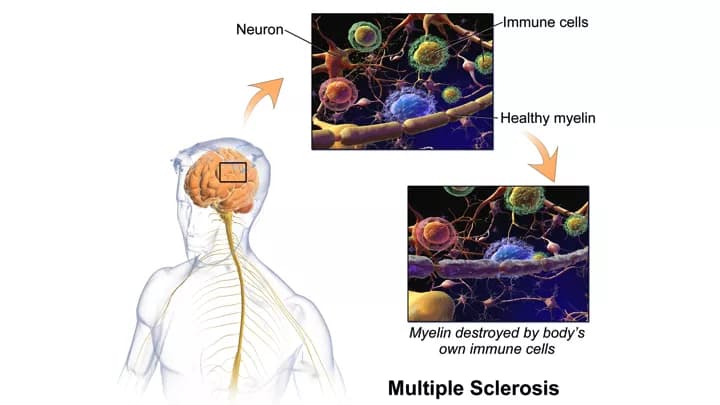
Revised 'Mcdonald Criteria' Expected To Speed The Diagnosis Of Multiple Sclerosis
The McDonald Criteria for the Diagnosis of Multiple Sclerosis have just been revised by a 30-member international panel of MS experts co-chaired by Jeffrey Cohen, MD (Cleveland Clinic) and Alan Thompson, MD (University College London). Recommended revisions are expected to speed the diagnostic process and reduce the chance of misdiagnosis.
The panel was convened under the auspices of the International Advisory Committee on Clinical Trials in MS, sponsored by the National MS Society and the European Committee for Treatment and Research in Multiple Sclerosis. The team published their findings in The Lancet Neurologyonline on December 21, 2017. The entire contents of the paper can be accessed free.
"Treating MS early and effectively is our best current way to limit permanent damage to the nervous system, so speeding the diagnosis of MS with improved accuracy is an important goal," commented Bruce Cohen, MD, Professor, Davee Department of Neurology and Clinical Neurosciences, Northwestern University, and chair of the Society's National Medical Advisory Committee.
"Efforts like the work of this international panel illustrate the National MS Society's role as a convening force to push forward progress that not only improves clinical care, but also identifies research gaps and opportunities," noted Bruce Bebo, PhD, Executive Vice President of Research at the Society. "The paper highlights the need for research to identify additional biological markers of MS and its subtypes. This gap impedes progress on several fronts, making it a critical target for the global MS research community," he continued.
Background: Multiple sclerosis can be difficult to diagnose because there is no single test that can determine that a person has MS. The process of diagnosis involves obtaining evidence from a clinical examination, medical history, lab tests and MRI imaging of the brain and sometimes the spinal cord. These tests are intended to rule out other possible causes of a person's neurological symptoms and to gather data consistent with MS. A key principle for diagnosing MS is to uncover evidence that demonstrates lesions in the central nervous system (brain and spinal cord) showing "dissemination in space" (DIS -- suggestions of damage in more than one place in the nervous system) and "dissemination in time" (DIT -- suggestions that damage has occurred more than once).
New research evidence and evolving knowledge since the previous 2010 McDonald Criteria for diagnosing MS compelled a 30-member international panel of MS experts to consider whether revisions would improve the speed and accuracy of the diagnosis of MS while reducing the possibility of misdiagnosis. The International Panel on Diagnosis of Multiple Sclerosis met in 2016 and 2017 under the auspices of the International Advisory Committee on Clinical Trials in MS, sponsored by the National MS Society and the European Committee for Treatment and Research in Multiple Sclerosis. The panel was co-chaired by Jeffrey Cohen, MD (Cleveland Clinic) and Alan Thompson, MD (University College London).
The panel reviewed prior diagnostic criteria and evidence published since the 2010 McDonald diagnostic criteria were established, to help inform evidence-based recommendations likely to speed the diagnostic process and reduce the incidence of misdiagnosis.
The result was a paper published online in The Lancet Neurology on December 21, 2017, "Diagnosis of multiple sclerosis: 2017 revisions of the McDonald criteria." The entire contents of the paper can be accessed free.
Key Things That Haven't Changed:
- MS is best diagnosed by a clinician with MS-related expertise with support of imaging and other tests.
- Dissemination of lesions in the nervous system in space and time are required, but the revisions provide additional avenues for obtaining supporting evidence of dissemination.
- The need to ensure there is no better explanation for the individual's symptoms remains an essential consideration.
- The McDonald Diagnostic Criteria apply to individuals experiencing a typical clinically isolated syndrome -- CIS. (CIS is a first episode of neurologic symptoms typical of an MS relapse in a person not known to have MS.)
What Are the Key Changes? In individuals with typical CIS:
- CSF oligoclonal bands -- Positive findings of oligoclonal bands in the spinal fluid can substitute for demonstration of dissemination of lesions in time in some settings.
- Types of lesions -- Both asymptomatic and now symptomatic MRI lesions can be considered in determining dissemination in space or time. (This does not include MRI lesions in the optic nerve in a person presenting with optic neuritis.)
- Site of lesions -- Cortical lesions have been added to juxtacortical lesions for use in determining MRI criteria for dissemination of lesions in space.
The Panel Also Recommended That:
- Brain MRI should be obtained during the MS diagnostic process, unless not possible. Spinal MRI should be obtained when additional data are needed to confirm the diagnosis.
- When spinal fluid is used as part of the diagnostic process, paired serum and CSF samples be analyzed to confirm that oligoclonal bands are unique to the CSF.
- At the time of diagnosis, the MS course should be indicated, and whether the course is active or not, and progressive or not; and the type and course of MS should be re-evaluated periodically as the disease evolves.
Avoiding Misdiagnosis of MS: Recent studies suggest misdiagnosis of MS is not uncommon. The paper emphasizes that if an individual does not have typical CIS, or is a member of a population in which MS is less common (such as children, older individuals, or non-white populations), additional testing can help gather additional evidence needed to firm up whether the person indeed has MS or something else that may require different treatment and management.
Related Articles
Test Your Knowledge
Asked by users
Related Centers
Related Specialties
Related Physicians
Related Procedures
Related Resources
Join DoveHubs
and connect with fellow professionals

0 Comments
Please log in to post a comment.